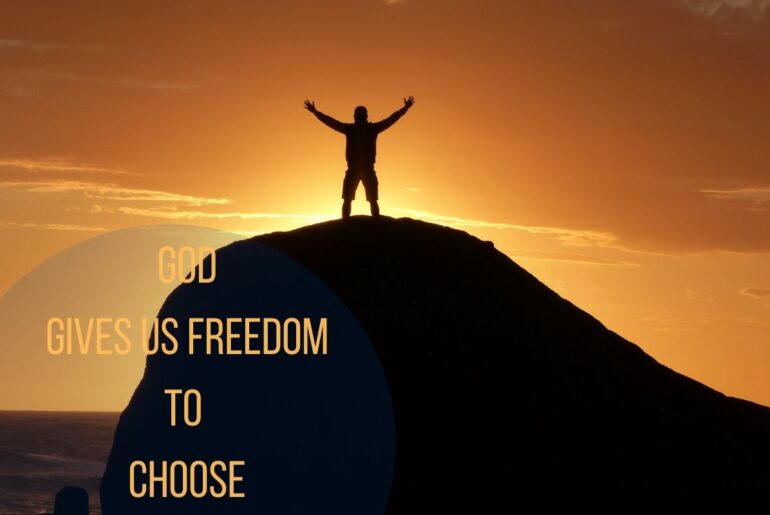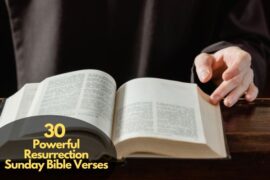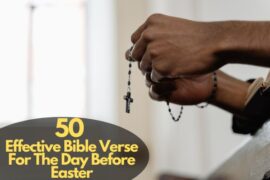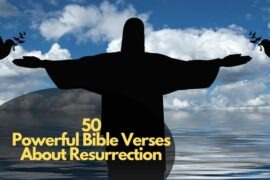The concept of free will is deeply rooted in human philosophy and spirituality. It’s the idea that we have the freedom to make choices, and to act according to our own desires and beliefs. In the realm of faith, particularly within Christianity, this concept takes on profound significance. In this article, we will explore the idea that God gives us the freedom to choose, delving into relevant Bible verses and examining the implications of this divine gift.
Contents
God Gives Us Freedom To Choose
Free will, in its essence, is the ability to make choices that are not predetermined or coerced by external forces. It’s the capacity to decide our own course of action, to choose between right and wrong, and to shape our lives.
The biblical perspective
The Bible addresses the concept of free will in various passages, affirming that God grants humanity the freedom to choose. In Deuteronomy 30:19, it is written: “I have set before you life and death, blessings and curses. Now choose life, so that you and your children may live.” This verse underscores the importance of personal choice in God’s plan.
The Gift of Free Will
The Genesis story
The story of Adam and Eve in the book of Genesis illustrates the gift of free will. God placed the tree of the knowledge of good and evil in the Garden of Eden, allowing Adam and Eve the choice to obey or disobey. Their decision to eat from the forbidden tree had consequences, highlighting the gravity of their free will.
God’s intention for free will
God’s intention in granting us free will was not to limit or control us but to allow us to experience the fullness of life. It is through our choices that we can grow spiritually and develop a meaningful relationship with our Creator.
The Consequences of Choice
Blessings and responsibilities
With free will comes the responsibility of our choices. The Bible teaches that our choices can lead to blessings or hardships. Proverbs 3:6 advises us to acknowledge God in all our ways, recognizing that our decisions have consequences.
The story of Adam and Eve
The consequences of Adam and Eve’s choice to eat the forbidden fruit are a powerful reminder of the weight of free will. Their disobedience led to separation from God and a fallen world.
The Paradox of Divine Sovereignty
Balancing God’s plan and human choices
One theological challenge is reconciling the idea of God’s sovereignty with human free will. How can God’s divine plan coexist with our ability to make choices?
Bible verses supporting both sides
The Bible contains verses that emphasize God’s sovereignty, as well as those that highlight human choice. Romans 8:28, for instance, speaks of God working all things for good, while Matthew 7:13 urges us to enter through the narrow gate, implying our responsibility in choosing the path.
Moral Responsibility
The role of conscience
Our conscience, guided by our understanding of right and wrong, plays a significant role in our moral responsibility. It helps us make choices aligned with our values.
Accountability in Christianity
Christianity emphasizes accountability for our choices. In Matthew 12:36, Jesus states that we will give an account for every idle word spoken, emphasizing the seriousness of our actions.
Grace and Redemption
Forgiveness for our choices
Despite our flawed choices, Christianity offers the concept of grace, where God forgives and redeems us. This forgiveness is exemplified through Jesus Christ, who paid the price for our sins.
The sacrifice of Jesus
The crucifixion of Jesus is a powerful testament to God’s love and redemption. Through His sacrifice, we have the opportunity to choose redemption and eternal life.
Challenges to Free Will
Predestination and determinism
Theological debates exist about predestination and determinism, suggesting that God may have already determined our fate. However, these concepts raise questions about the nature of free will.
Theological debates
Theologians have grappled with the balance between God’s omniscience and human choice for centuries, leading to diverse interpretations and beliefs.
Human Experience and Free Will
Everyday choices
Free will is not limited to monumental decisions but extends to our everyday choices. These choices shape our character and influence our interactions with others.
Free will in contemporary society
In today’s society, the concept of free will is often intertwined with discussions about autonomy, ethics, and personal responsibility.
The Freedom to Reject God
The Story of the Prodigal Son
The parable of the Prodigal Son illustrates the freedom to reject God. The son left his father, representing those who turn away from their faith.
Atheism and agnosticism
Atheism and agnosticism reflect individuals’ choices to reject or question the existence of God. These positions highlight the extent of our free will.
The Importance of Prayer
Seeking God’s guidance
While we have the freedom to choose, prayer is a means of seeking God’s guidance and aligning our choices with His will.
God’s response to prayer
The Bible assures us that God hears our prayers and responds, offering guidance and wisdom when we seek His help in making choices.
Living Out Our Free Will
Embracing faith and values
Choosing to live according to one’s faith and values is a significant aspect of free will. It reflects a commitment to a certain way of life.
Making ethical choices
Ethical decision-making is another crucial dimension of free will. It involves choosing actions that benefit others and aligns with moral principles.
Conclusion
In conclusion, the concept of free will is a profound gift from God, allowing us to shape our lives, make moral choices, and seek a relationship with our Creator. While theological debates may persist, the Bible emphasizes our responsibility for our choices and the importance of seeking God’s guidance through prayer. Our free will, though sometimes challenging, ultimately offers us the opportunity for grace, redemption, and a meaningful connection with God.
FAQs
1. What does the Bible say about free will?
The Bible affirms the concept of free will in passages like Deuteronomy 30:19, where God sets before us choices and encourages us to choose life. However, it also acknowledges God’s sovereignty, leading to theological discussions about the balance between divine plan and human choice.
2. Can our choices go against God’s plan?
The Bible suggests that God’s plan can incorporate our choices, working all things together for good (Romans 8:28). However, understanding the full scope of this relationship is a theological challenge.
3. Is free will a burden or a blessing?
Free will is both a blessing and a responsibility. It grants us the capacity to shape our lives and make moral choices, but it also holds us accountable for our decisions.








